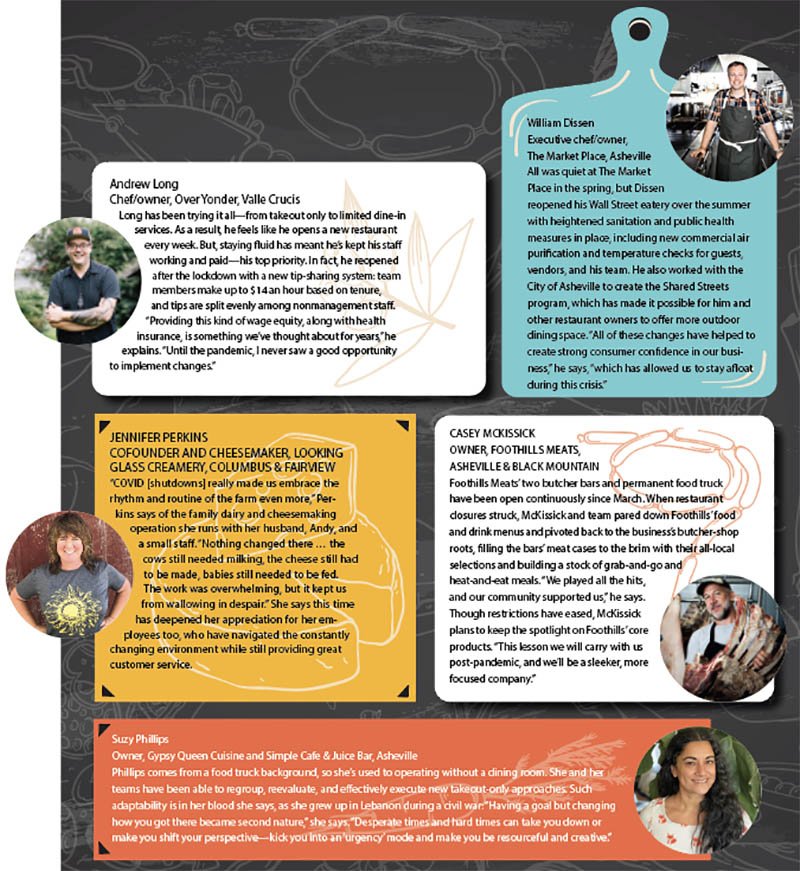Silver Linings
Silver Linings : WNC’s resilient chefs and artisan food producers look on the bright side
The food and beverage industry has been especially hard-hit by the pandemic. But the area’s restaurateurs and food producers are an intrepid bunch. Here, a handful share how they’ve adapted and the positives they’ve experienced while continuing
to cook and create for us.
Andrew Long
Chef/owner, Over Yonder, Valle Crucis
Long has been trying it all—from takeout only to limited dine-in services. As a result, he feels like he opens a new restaurant every week. But, staying fluid has meant he’s kept his staff working and paid—his top priority. In fact, he reopened after the lockdown with a new tip-sharing system: team members make up to $14 an hour based on tenure, and tips are split evenly among nonmanagement staff. “Providing this kind of wage equity, along with health insurance, is something we’ve thought about for years,” he explains. “Until the pandemic, I never saw a good opportunity to implement changes.”
William Dissen
Executive chef/owner, The Market Place, Asheville
All was quiet at The Market Place in the spring, but Dissen reopened his Wall Street eatery over the summer with heightened sanitation and public health measures in place, including new commercial air purification and temperature checks for guests, vendors, and his team. He also worked with the City of Asheville to create the Shared Streets program, which has made it possible for him and other restaurant owners to offer more outdoor dining space. “All of these changes have helped to create strong consumer confidence in our business,” he says, “which has allowed us to stay afloat during this crisis.”
Jennifer Perkins
Cofounder and cheesemaker, Looking Glass Creamery, Columbus & Fairview
“COVID [shutdowns] really made us embrace the rhythm and routine of the farm even more,” Perkins says of the family dairy and cheesemaking operation she runs with her husband, Andy, and a small staff. “Nothing changed there … the cows still needed milking, the cheese still had to be made, babies still needed to be fed. The work was overwhelming, but it kept us from wallowing in despair.” She says this time has deepened her appreciation for her employees too, who have navigated the constantly changing environment while still providing great customer service.
Casey McKissick
Owner, Foothills Meats, Asheville & Black Mountain
Foothills Meats’ two butcher bars and permanent food truck have been open continuously since March. When restaurant closures struck, McKissick and team pared down Foothills’ food and drink menus and pivoted back to the business’s butcher-shop roots, filling the bars’ meat cases to the brim with their all-local selections and building a stock of grab-and-go and heat-and-eat meals. “We played all the hits, and our community supported us,” he says. Though restrictions have eased, McKissick plans to keep the spotlight on Foothills’ core products. “This lesson we will carry with us post-pandemic, and we’ll be a sleeker, more focused company.”
Suzy Phillips
Owner, Gypsy Queen Cuisine and Simple Cafe & Juice Bar, Asheville
Phillips comes from a food truck background, so she’s used to operating without a dining room. She and her teams have been able to regroup, reevaluate, and effectively execute new takeout-only approaches. Such adaptability is in her blood she says, as she grew up in Lebanon during a civil war: “Having a goal but changing how you got there became second nature,” she says. “Desperate times and hard times can take you down or make you shift your perspective—kick you into an ‘urgency’ mode and make you be resourceful and creative.”
